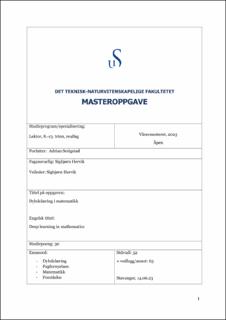| dc.description.abstract | This study examines deep learning in mathematics and investigates whether a focus on deep learning can lead to deep understanding of a mathematical topic. Deep learning proves to be a diverse concept with various interpretations and perspectives. The study presents different viewpoints that are relevant in the context of schools. In order to gain an understanding of what deep learning in mathematics can entail, the different perspectives on deep learning are connected to understanding, competence, and proficiency in mathematics.
To discuss how the focus on deep learning affects students' mathematical understanding, qualitative interviews were conducted with students in their third year of upper secondary school. Three S2 students and three R2 students were individually asked to demonstrate their understanding of the topic of integration. The responses from six students naturally did not provide enough data to draw conclusions. Nevertheless, the students' answers sparked a meaningful discussion. The interview questions were designed based on theory related to deep learning and mathematical understanding, competence, and proficiency.
The results show that most informants had surface-level knowledge of the topic of integration. A mixture of mathematical concepts, limited memory, and a general lack of overview were evident in several cases. This may indicate that several students have relied on memorization as a learning strategy rather than learning with understanding. On the other hand, two students stood out. They were able to identify connections and understand concepts and methods. However, these students also showed hints of surface-level knowledge in certain situations. Therefore, I cannot definitively conclude that they achieved a deep understanding of integration. However, what is certain, is that both of them displayed signs of having a good understanding of the topic. This suggests that the focus on deep learning may have positively contributed to the understanding of some students but not all. | |
